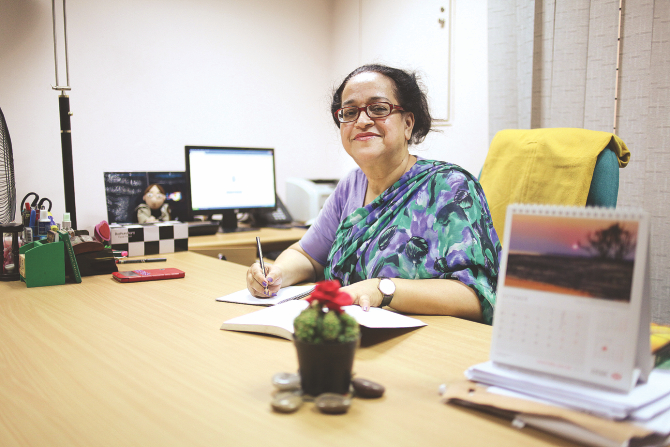Sultana's Dreams

A popular name in the world of academia, or at least in Dhaka, Razia Sultana Khan, is a professor of English and also a published writer. Born in the old part of Dhaka in the 1950s, Sultana had had the opportunity to explore many parts of Bangladesh and also the world. "My father was a carrier diplomat. My mother was a home maker and being the wife of a diplomat she was kept pretty busy not just looking after us but with her social duties," she says.
Head of the Department of English at Independent University, Bangladesh from 2008 to 2011, Sultana was also known for organising conferences: one on Mark Twain and another on Tennessee Williams. "I also initiated a monthly Teacher Development Workshop series, and the IUB Book Club which is open not just to IUB students and teachers but also to outsiders," she says. In addition to seminars and workshops, Sultana also started a literary journal, CHAOS, of which she is the Editor. "He we publish some of the best writing being done by writers of English in Bangladesh, be they Creative or Critical," she adds.
Razia Sultana Khan has a PhD in Creative Writing from the University of Nebraska, Lincoln (UNL). "I had always “dreamt” of doing my PhD but had to put it on hold because I had a young family and aging parents," she says. "By the time my children were older my father had passed away. So before my deferred dream, “festered or dried up like a raisin in the sun, '(curtsey of Langston Hughes: “Dream Deferred)' I went off to do my PhD. The other more basic reason is that you cannot really succeed in academia without a doctorate. I won't say it makes you a better teacher because it doesn't; but it does provide you with all the tools to become a better one."
"I was at Dhaka University in the mid seventies and to quote a famous writer, 'It was the best of times. It was the worst of times,'" she says. "It was the best of times because in your early 20s the whole world is a delightful place. We had returned to what was now Bangladesh. I was blessed in having some wonderful teachers: Sirajul Islam Chowdhury (SIC), Soraiya Khan, Razia Khan Amin, KMN Munim, Imtiaz Habib, Iniri Hussain, Fakrul Islam and Niaz Zaman. I will be every grateful to them for moulding me into the person I am today."
According to Sultana, the English curriculum has changed a lot at educational institutions, and that too for the better. "Applied Linguistics and ELT have gained popularity," she says. "Previously a degree in English basically meant English Literature. The courses here mainly comprised of the canons: Shakespeare, Milton, Blake, Bacon and so on. Now the literature syllabus includes, not just the received canons but also those approaching it. The English degree now offers, in addition to English Literature and Comparative literature, a whole slew of Language and Language Teaching courses."
Despite all this, why the English departments at universities are getting smaller by the semester, one may wonder. "There is a misconception that the market for English graduates is limited," she says. "The belief is that the only option open to them is teaching, and the question often bluntly floated is 'How much can an English teacher earn anyway?' It is given the same consideration that studying Art or Theatre or even Sports was given a few decades ago. And look at what cricket players are earning now. My opinion is that with an undergrad degree under your belt the world really is your oyster. A degree in English gives you the skill and confidence to make a success of whichever area you wish to major in."
As a teacher of language, Sultana believes that the best teachers should be teaching at school level. If young people at Elementary and Secondary School are given a strong and solid foundation, the task at the tertiary level becomes so much simpler and more fruitful. "University teachers would then be able to build on those basic skills and offer students a much more comprehensive as well as extensive and varied education," she says. "Unfortunately our students at university level are still battling with language proficiency and basic academic skills (e.g. reading texts, listening to lectures and making notes)."
Some of Sultana's stories have been published in anthologies like The Best New American Voices, published by Harvest Books, USA, The Rainbow Feast: New Asian Short Stories published by Marshall Cavendish, and in a collection of short stories published by the Daily Star. "I have a collection of short stories, Palki and other Tales of Seduction, published by Ankur a couple of years back. Sadly my publisher for whatever incomprehensible reason has not made my book available anywhere," she says. "I am working on this however and hopefully it will be available at Omni, BookWeb, Friends and a few other major book stores within a month or so."


 For all latest news, follow The Daily Star's Google News channel.
For all latest news, follow The Daily Star's Google News channel. 



Comments